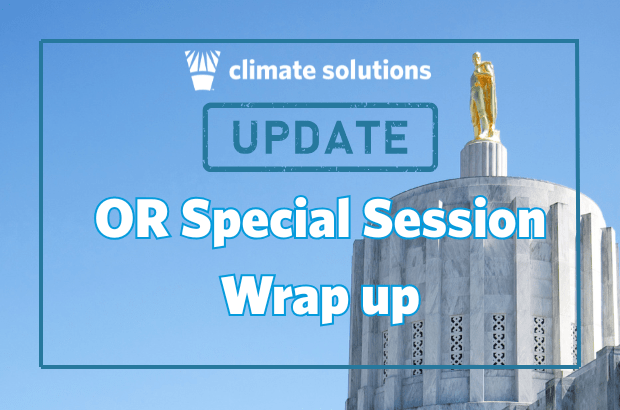If you’ve been tracking politics in Oregon, you probably know that much of this year has been consumed by deliberation around a comprehensive transportation funding package. The 2025 transportation debate concluded–at least for now–with a vote on a stopgap measure at the end of September. This stopgap transportation funding bill was brought forward in a special session after the legislature failed to adopt a much larger, comprehensive bill during the 2025 legislative session, which ended in June. The stopgap averted immediate layoffs and cuts to essential Oregon Department of Transportation services, doubled state support for transit for two years, and added audits and accountability after project overruns. The bill funds these through modest increases to the gas tax and title and registration fees. It also mandates that electric and plug-in hybrid vehicle drivers join a pay-per-mile fee system called a road usage charge. (More details on this below.)
While this bill helps stabilize transit service statewide, it does nothing to address the safety, climate, and air quality needs in Oregon’s transportation. The adopted bill does not invest a single dollar in complete, safe streets, off-road bike networks and trails, or clean, electric cars and trucks. This is incredibly disappointing to us and our partners at Move Oregon Forward, who have worked extensively over the last two years to grow a diverse coalition and build full spectrum support for a fairer, safer, and cleaner transportation system for Oregon.
Beyond the lack of investment in key areas, the special session bill also places new and undue burdens on Oregonians who choose to drive electric cars. Based on our calculations, which have been elevated by multiple sources at OPB and The Oregonian, electric and plug-in hybrid vehicle drivers will pay more than the vast majority of gas-powered car owners. We support a road usage charge and agree that every driver—whether they drive electric, hybrid, or gas—should pay their fair share to maintain Oregon’s roads. But rather than delivering parity, the recently passed bill penalizes people who choose cleaner vehicles. To be clear: EVs are essentially a rounding error in the decline of gas tax revenues. They do not wear out the roads any faster than any other passenger car. They do provide critical public health, affordability and economic benefits for Oregonians by reducing air pollution and fuel costs and creating jobs in our clean energy economy.
In short, the adopted bill represents a net-negative for climate and clean air: it discourages the transition to cleaner cars at exactly the time when Oregon needs to accelerate that shift– setting a damaging precedent for other states and undermining air quality and climate goals as the federal government is actively dismantling decades of clean transportation progress.
Our north star is simple: we need to be investing in Oregon, not DOGE’ing essential safety, transit, and climate programs or discouraging the transition to clean transportation. We can, and should continue investing in transportation options that help Oregonians save money by going electric and using walking, biking, and transit. More than ¼ of Oregonians lack access to a car. Failure to invest in services that Oregonians need and rely on will only hurt people with lower incomes, younger and older Oregonians, and those who can’t drive.
So where does that leave us? The stopgap funding measure keeps transit services running– but only until 2027, when transit funding is set to expire. And key state programs to support the transition to electric vehicles, trucks, and charging infrastructure have been left out to dry just as Congress has eliminated federal incentives for clean transportation. The reality is that the Legislature has significant work ahead in 2026 and 2027 to continue addressing transportation in Oregon.
In the 2026 short session, Climate Solutions will advocate for solutions that defend Oregon values by responding to federal rollbacks that threaten our climate, equity, and economic goals. We will also work to refine the road usage charge for electric vehicles so that it better reflects parity before it fully kicks in during 2027. As we look ahead to the 2027 long session, we will continue to work closely with our partners at Move Oregon Forward to deliver progress toward a fair, accountable, safe, and sustainable transportation system.
Source link
Brett Morgan www.climatesolutions.org



